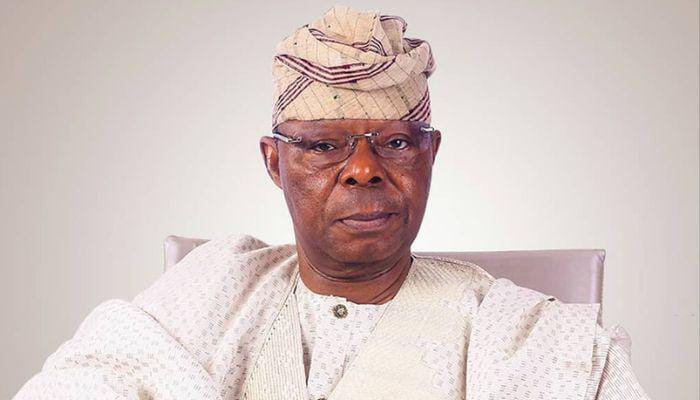Twelve years. A dozen years that have transformed Nigeria’s corporate landscape, witnessed technological revolutions, and seen the rise of a new generation of business leaders. In the labyrinthine world of Nigerian corporate history, some stories refuse to fade into obscurity.
Apparently, like our favourite movie heroes from the ’90s, can rise from the dead. In this case, a commercial transaction emerging from the shadows with a renewed intensity that has caught the attention of Nigeria’s business elite and legal corridors.
The current legal proceedings involving the Economic and Financial Crimes Commission and Dr Oba Otudeko represent more than just a commercial dispute—they are a complex tapestry of institutional memory, professional reputation, and the intricate dance of power and accountability. Dr. Oba Otudeko—a name synonymous with Nigerian business leadership—finds himself at the centre of a legal maelstrom that threatens to challenge the legacy he has spent decades constructing. This is not just a legal dispute, but a seismic event in the business landscape.
The Anatomy of a Dormant Dispute
Picture Lagos in the early 2000s. The banking sector trembled on the brink of revolutionary change. The Central Bank’s bold consolidation policies in 2005 were about to rewrite Nigeria’s entire economic narrative. From 89 fragmented banking institutions to just 25 robust entities, this was economic surgery of the most precise kind. Consequently, the total banking sector capitalisation exploded from ₦300 billion to over ₦2.6 trillion.
Dr. Oba Otudeko emerged in this complex symphony of institutional restructuring. His journey from the Cooperative Bank to building Honeywell Enterprises, and then rising to the pinnacle of Nigerian business leadership represents more than individual success – it embodies the transformative potential of strategic vision and institutional commitment.
What makes this legal pursuit particularly intriguing is its temporal complexity. A commercial transaction from 2012 – 2013 suddenly resurfaces in 2025, raising critical questions about timing, motivation, and the broader dynamics of institutional accountability. According to reports, the prominent entrepreneur found out in the media that he had been charged by EFCC for an alleged 12.3bn fraud. In addition, the initial investigation was concluded seven years ago and was thought to have been resolved.
Sources suggest the dispute involves complex financial transactions related to First Bank of Nigeria, a cornerstone institution in which Oba Otudeko has historically played a significant leadership role. The Economic and Financial Crimes Commission (EFCC) has shown renewed interest in examining these historical transactions, prompting widespread speculation.
Beyond the legal technicalities lies a profound human story. Oba Otudeko represents a generation of business pioneers who navigated Nigeria’s complex economic terrain during periods of significant transformation. The Commander of the Federal Republic (CFR) has been a business leader, mentor, institution builder, and quiet force behind numerous successful Nigerian enterprises. His track record of contributing to national economic development starkly contrasts the current legal challenges.
But the public must ask the necessary questions. What institutional mechanisms allow for such delayed legal pursuits? How do such proceedings impact investor confidence and corporate governance? Why resurrect a seemingly resolved commercial matter after twelve years? The timing and nature of these proceedings raise critical systemic questions.
To understand this moment, it is imperative to examine similar institutional battles. For instance, the rapid expansion of Intercontinental Bank Saga in 2009, with total assets worth ₦2.1 trillion, was followed by systemic vulnerabilities and, subsequently, a complete institutional restructuring. In 2012, the complex shareholder disputes and legal battles surrounding the African Petroleum Corporation highlighted the intricate nature of corporate governance in Nigeria, which must be addressed.
We must also be careful not to conflate legal proceedings with predetermined guilt. This case transcends an individual narrative. It represents a broader dialogue about institutional accountability, the evolving nature of corporate governance in Nigeria, and the delicate balance between legal scrutiny and professional reputation.
Nevertheless, there are key observations. The legal timelines, and ‘landmines’ in Nigeria are complex and multilayered, presenting a formidable challenge to business leaders. While a sterling personal reputation remains a critical form of economic capital, it can also be defeated by a barrage of media narratives and social media innuendoes. And yes, corporate accountability is still a nuanced, contextual concept, but the future demands enhanced technological transparency, more sophisticated governance models, greater integration of ethical and social considerations and increased stakeholder participation.
The legal proceedings continue, with the next hearing scheduled for February 13. The business community watches with a mixture of concern and cautious optimism. The outcome could potentially set significant precedents for examining and adjudicating historical commercial transactions, a potential game-changer in the Nigerian corporate governance landscape.
Dr. Otudeko’s response remains measured and principled. His commitment to addressing the matter through appropriate legal channels demonstrates a continued respect for institutional processes. In the grand narrative of Nigerian business leadership, this chapter—however challenging—is but one moment in a distinguished journey. The true measure of leadership is not the absence of challenges but the grace and integrity with which they are confronted.
The story continues, and history will be the ultimate judge.
Abiola writes from Lagos

